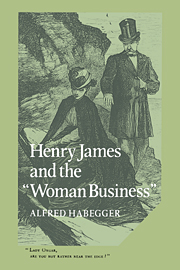Book contents
- Frontmatter
- Contents
- Acknowledgments
- Abbreviations
- 1 Introduction
- 2 The Lessons of the Father: Henry James, Sr., on Sexual Difference
- 3 Precocious Incest: First Novels by Louisa May Alcott and Henry James
- 4 The Chains of Literature: Elizabeth Stoddard and Henry James
- 5 Anne Moncure Crane Seemuller: Henry James's Jocasta
- 6 Minnie Temple's Death and the Birth of Henry James's Imagination
- 7 The Fatherless Heroine and the Filial Son: Deep Background for The Portrait of a Lady
- 8 The Return of the Father in The Bostonians
- 9 Conclusion
- Notes
- Works Cited
- Index
4 - The Chains of Literature: Elizabeth Stoddard and Henry James
Published online by Cambridge University Press: 04 November 2009
- Frontmatter
- Contents
- Acknowledgments
- Abbreviations
- 1 Introduction
- 2 The Lessons of the Father: Henry James, Sr., on Sexual Difference
- 3 Precocious Incest: First Novels by Louisa May Alcott and Henry James
- 4 The Chains of Literature: Elizabeth Stoddard and Henry James
- 5 Anne Moncure Crane Seemuller: Henry James's Jocasta
- 6 Minnie Temple's Death and the Birth of Henry James's Imagination
- 7 The Fatherless Heroine and the Filial Son: Deep Background for The Portrait of a Lady
- 8 The Return of the Father in The Bostonians
- 9 Conclusion
- Notes
- Works Cited
- Index
Summary
Elizabeth Stoddard (1823–1902) was the daughter of the man whose shipyard built the Acushnet, the whaling vessel in which Melville sailed. She married a negligible poet, Richard Henry Stoddard, and lived with him in New York for most of her long life, summering at her childhood home on Buzzards Bay. The New York correspondent for the leading newspaper of the Far West, the Alta California, Stoddard attended a women's rights convention in 1857 and was impressed by a speech by Lucy Stone. She began writing fiction as well as poetry and sold her first story to the Atlantic in 1861. The following year saw the publication of her first novel, The Morgesons, in writing which she “endeavored to make a plain transcript of human life … without taking on a moral here or an explanation there.” We can sense the special underground reputation this novel conferred on Stoddard from a private remark made to Caroline Dall and recorded in her journals: Elizabeth Davis Martin confided that “Mrs. Stodard [sic] the author of the ‘Morgessons’ [sic] and her most intimate friend is a person true and passionate but no moral help to her” (5 July 1866, Dall Papers, MHS). Stoddard requires detailed consideration here for two reasons: She wrote the outstanding novel so far discovered by the renewed interest in American women writers of the nineteenth century, and she was the target of the most ferocious, in fact vicious, review Henry James is known to have written.
- Type
- Chapter
- Information
- Henry James and the 'Woman Business' , pp. 85 - 101Publisher: Cambridge University PressPrint publication year: 1989



